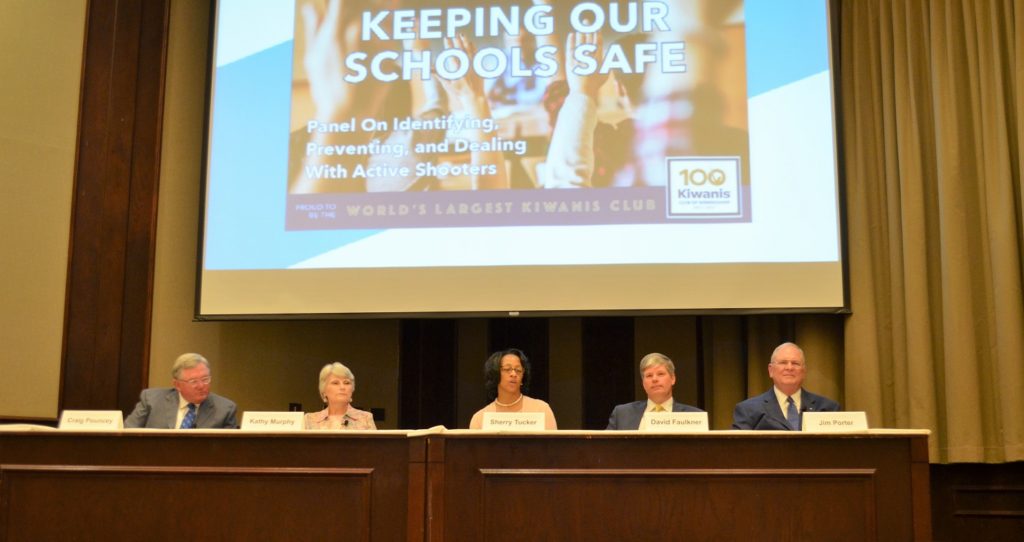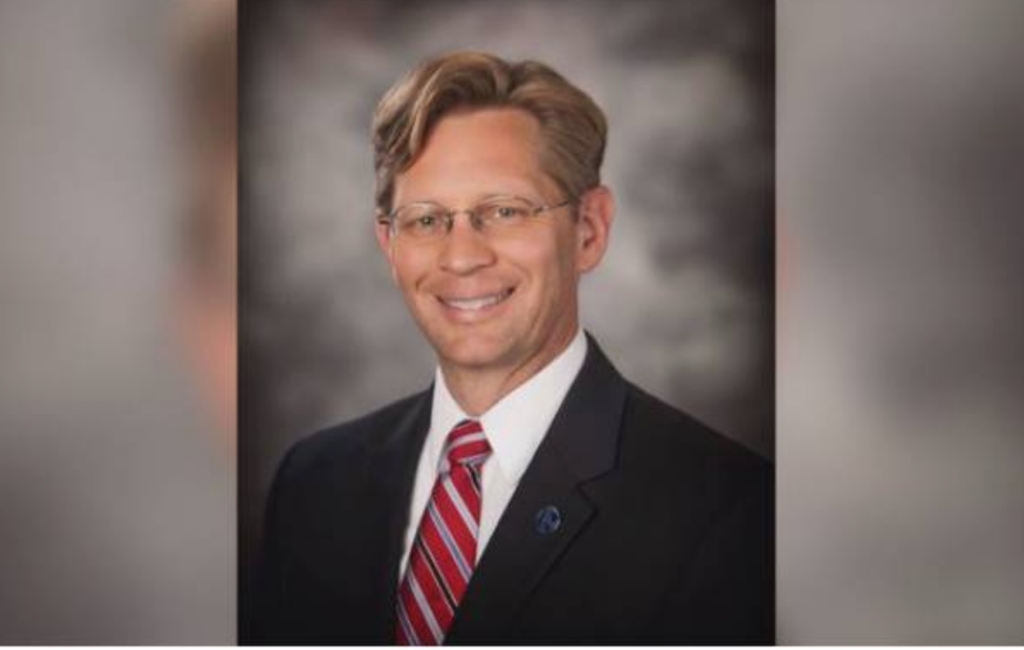Dr. Walter Gonsoulin named as interim superintendent for Alabama school district

An Alabama school district has a new leader. Jefferson County Schools has named Dr. Walter Gonsoulin as interim superintendent. WBRC-TV reports Gonsoulin will start Sept. 27, the day after Dr. Craig Pouncey ends his term. Gonsoulin is currently the deputy superintendent of school and community support. Pouncey officially resigned Wednesday after five years in the post. He’s leaving to take over as president of Coastal Alabama Community College. The Jefferson County Board of Education will have up to 180 days to name a new superintendent and 90 days to publicly announce the process for the superintendent search. It is required to post a 30-day vacancy for the superintendent position. Republished with the permission of the Associated Press.
Jefferson County schools to add resource officers

An Alabama county plans to put a school resource officer in every county school as part of a new safety plan, local officials announced in a Thursday press conference. Jefferson County Sheriff Mike Hale said there are currently 25 officers for the 56 schools in the county school system. He said they plan to hire enough contract deputies to cover all 56 county schools. “We are committed to ensuring that our most precious resource, our children, have a safe environment to learn and grow up in,” Hale said. The plan to try to boost the number of trained police officers in schools was announced along with the creation of a new threat assessment team. Hale said his department is interested in hiring retired law enforcement officers because of their experience, but he said additional training will be done for learning to work in a school environment. The cost of the additional hires is an estimated $1.2 million which will be split between the Jefferson County Board of Education. Hale told reporters that cost could go up to $1.5 million with overtime. “Can we afford this? The answer is we can’t afford not to do it,” Hale said. The sheriff said a threat assessment team, comprised of an investigator, education official and mental health professional, will identify troubling behavior patterns and assist students. Superintendent Craig Pouncey thanked the sheriff and the Jefferson County Commission for their support of the plan. The announcement comes two days after a federal school safety commission met in Alabama. The Federal Commission on School Safety met Tuesday at the Alabama Capitol for their final listening session on how to improve school safety. The group was created by President Donald Trump after 17 people were killed at a shooting at a Florida high school in February. Republished with the permission of the Associated Press.
Alabama panel addresses school safety

As educators prepare for a new school year, leading their discussions is the issue of keeping students safe, in a time when no corner of the country seems immune to school violence. Tuesday, the Kiwanis Club of Birmingham hosted a school safety forum with two local superintendents, the president of the Alabama Education Association, a state legislator and the former president of the National Rifle Association. While they differ on how to keep students safe, they agreed on one point: Something needs to be done. In a perfect world, they said, every school would be assigned its own police officer, known as a school resource officer (SRO). Since most districts can’t afford police for every school, keeping students safe could mean installing metal detectors, adding security cameras or blocking outside entrances. For the more rural and poorer school systems, a new – and controversial – law allowing administrators to be armed under certain circumstances could help. The forum, “Keeping Our Schools Safe: Identifying, Preventing and Dealing with Active Shooters,” featured as panelists Craig Pouncey, superintendent of Jefferson County schools; Kathy Murphy, superintendent of Hoover city schools; Sherry Tucker, president of the Alabama Education Association; state Rep. David Faulkner, whose district includes Jefferson County; and Jim Porter, past president of the NRA. The Jefferson County school system is the state’s second-largest, with 36,000 students and 56 schools. Some of its schools are urban, others extremely rural. Some are 50-plus years old; others are state of the art. For the upcoming school year, the district bought 2,555 devices that add a secondary lock to classroom doors in a lockdown situation. The district added five SROs, bringing the total to 27. “We can’t put an SRO at every school, it’s just not financially feasible for us,” Pouncey said, adding that the additional five SROs cost the district $400,000 annually. He is not in favor of arming educators, a point agreed with by Murphy. Murphy said Hoover is “privileged” to have an officer stationed at every school, with three SROs assigned to each of the high schools. She’s been on the other side of that equation when she was superintendent of Monroe County schools. “In Monroe County, there was a little community known as Packers Bend. It took me an hour and 10 minutes to get from the central office to drive to that school, which was on the other side of the Alabama River,” she said. “It was always that little school that troubled me. Sixty-one children are in that school.” The program does not include teachers, and will require that the administrators successfully complete training created and certified by the Alabama Law Enforcement Agency. In rural areas, response time for first responders can be 45 minutes or more, said Faulkner. Those are the areas that could benefit from the new sentry program announced in May, which permits administrators in schools without an SRO to have a secured firearm on campus. The NRA’s National School Shield Program was created in 2012 following the fatal shooting of 20 students and six teachers at Sandy Hook Elementary School in Newtown, Connecticut. Porter, an attorney who was president of the NRA from 2013 to 2015, said the goal of the program is improving security and preventing future shootings. “The important takeaway here is that any school that needs help finding additional security measures, we will help free of charge,” he said, adding that no school system in Alabama has applied for the NRA’s help. After the forum, Birmingham Board of Education member Mary Boehm spoke about the March shooting at Huffman High School that left student Courtlin Arrington dead. “We have figured out that the student voice is what really matters,” Boehm said. “After the shooting at Huffman, it was clear that the students knew this gun was in the school. They know about guns that are in our schools every single day.” Mental health is one of the biggest challenges facing school systems, she said. “When I called my colleagues at mental health, I was told that funds have been cut so drastically that we are barely able to serve adults, let alone children,” Boehm said. “And we’re not prepared to handle that.” Republished with the permission of the Alabama Newscenter.
A+ Education Partnership urging Eric Mackey to implement new changes

Alabama’s A+ Education Partnership, a Montgomery-based non-profit, called on newly chosen State Superintendent, Eric Mackey to focus his efforts on implementing four new education policies the partnership believes will boost student achievement across the state. Mackey, who beat out Hoover City Schools Superintendent Kathy Murphy and Jefferson County Superintendent Craig Pouncey for the position in late April, started working in his new position on Monday. “We have worked closely with Dr. Mackey for many years, and we look forward to continuing this partnership with him as our State Superintendent of Education,” said president of A+ Education Partnership, Caroline Novak. “Dr. Mackey is keenly aware of the challenges facing Alabama’s schools, and he knows that change will not occur overnight. Our proposals are commonsense steps that can make an immediate impact for all children. We encourage his consideration and support as he works to unite Alabamians for educational progress.” In January, The Columbia Group, a network of organizations from several states across the Southeast who work to improve education in their respective states; released a new study detailing the four new education policies they believe will improve student learning throughout the South. The A+ Education Partnership assisted six other groups in publishing the study, titled: Accelerating the Pace: The Future of Education in the American South. Although the study found that the South has made progress in recent decades, achievement gaps between more affluent students and historically disadvantaged classmates became more pronounced between 2005 and 2015. To address these concerns, A+ is encouraging Mackey to implement these four priority areas for student improvement: Make the South the best place to teach in the nation: Identify, recruit and retain teachers and principals who have the talent, preparation and continued support they need to help students succeed. Provide new types of academic—and nonacademic—support for today’s students: Students need an array of support systems to help them deal with physical and emotional health issues that can impact their learning. Clear the path for all students to their next steps in education and work: Build a much stronger, supportive bridge from high school into college, career training or a good job. Ensure resources are adequate and targeted: Invest in education to meet the needs of every child, and consider additional support for students who need the most help to catch up.
Board of Education approves new superintendent Eric Mackey’s contract

The Alabama Board of Education approved new State Superintendent, Eric Mackey‘s compensation package and contract worth $311,000 on Thursday with a 7 to 2 vote. Mackey, who beat out Hoover City Schools Superintendent Kathy Murphy and Jefferson County Superintendent Craig Pouncey for the position in late April, starts on Monday. The contract details include a base salary of $245,000 a year for the initial three-year term, a $21,000 annual housing allowance, state-owned vehicle for official travel, reimbursement of up to $5,000 for professional development activities annually, and professional association dues. Mackey will also receive a 3 percent raise each year starting in 2019, unless the board votes against it. Board of Education Vice President, Montgomery Republican Stephanie Bell and board member, Montgomery Democrat Ella Bell were the two board members who voted no to Mackey’s contract. Stephanie Bell told AL.com that the contract was not taxpayer-friendly, and gave too much control to Mackey and not enough to the board. Ella Bell said she did not agree with the amount of the raise, stating that teachers will only be receiving a 2.5 percent raise next year. Another point of dissatisfaction from Bell was that the contract does not require and annual evaluation. She said the evaluation should be required, while other board members said the decision should be made year by year. If the board does find fault with Mackey’s performance, they must make a specific proposal for changes. Mackey has an extensive background in education, serving as a former teacher, principal and city superintendent, and has been serving as the executive director of the School Superintendent Association of Alabama since 2010.
Alabama education board chooses Eric Mackey for state superintendent

The director of Alabama’s superintendent association, Eric Mackey, was chosen Friday as the state’s new education superintendent in a tight vote clouded by an ongoing lawsuit between a candidate and a state education board member. Mackey beat out Hoover City Schools Superintendent Kathy Murphy and Jefferson County Superintendent Craig Pouncey. A fourth finalist, former Texas Education Commissioner Robert Scott, dropped out of the running Friday morning. Mackey is a former teacher, principal and city superintendent who has served as the executive director of the School Superintendent Association of Alabama since 2010. He said his top priority will be to find an “assessment that fits right” on top of addressing unequal funding between rural and urban areas and school safety concerns. Members of the Alabama State Board of Education voted for Mackey after three hours of interviews with the three finalists in Montgomery on Friday. There were five votes for Mackey and four for Pouncey. After the vote was announced, board member Ella Bell raised the concern that Pouncey has an ongoing lawsuit against another member Mary Scott Hunter and others saying he was victim to a scheme that kept him from getting the job two years ago. Before the 2016 vote, someone anonymously gave board members a packet of information, including internal department emails, accusing Pouncey of getting state staff to write his 2009 dissertation when he was with the department. Pouncey said the accusation was untrue. A subsequent department report found that employee statements cleared Pouncey. Hunter did not recuse herself from the vote, saying she was fair and impartial. She voted for Mackey. Bell, who voted for Pouncey, said she wanted to initiate a lawsuit because without Hunter’s vote there could have been a run-off. “She shouldn’t be able to vote in this because it’s understood they have an adversarial relationship,” Bell said. Alabama Gov. Kay Ivey, who serves as board president, said she had not spoken to any attorneys about the legal question but she was not aware of any rule where the chair could tell a board member to recuse him or herself. The board was seeking a replacement for former Superintendent Michael Sentance, who resigned in September after one year and one day on the job. Sentance stepped down after receiving a poor performance evaluation. A search firm whittled a field of more than 40 applicants to seven semifinalists, who were voted by the board down to the finalists. On Friday, each finalist was asked the same nine questions in an hour-long interview. Questions covered how to make students job-ready, creating a framework for assessment, ensuring equal funding between rural and urban schools and spearheading state interventions to help failing schools like is currently happening in Montgomery. Ivey said “this is the most important decision that this board will make in our terms.” She said she voted for Mackey because of his support for her “Strong Start, Strong Finish” initiative and his focus on teaching students computer science and coding. “I believe Dr. Mackey will serve us well and we will see forward thinking results,” she said. In his interview, Mackey expressed a desire to stay long-term – at least eight or ten years – in the role. Ivey said “that would suit me fine.” Mackey will start May 14. Republished with the permission of the Associated Press.
Alabama education board to choose next state superintendent

Alabama State Board of Education members will choose the state’s next superintendent of education Friday. Board members will interview the four finalists Friday in Montgomery to pick the next head of Alabama’s education system. The finalists are Jefferson County Superintendent Craig Pouncey, Hoover City Schools Superintendent Kathy Murphy, Superintendent Association of Alabama Executive Director Eric Mackey and former Texas Education Commissioner Robert Scott. The board is seeking a replacement for former Superintendent Michael Sentance who resigned in September after one year and one day. He stepped down after he received a poor performance evaluation. Republished with the permission of the Associated Press.
State Board of Education names four superintendent finalists

The search for Alabama’s next education superintendent was narrowed Friday to four finalists, as Alabama State Board of Education members looked mostly within the state for the next public schools chief. Jefferson County Superintendent Craig Pouncey, Hoover City Schools Superintendent Kathy Murphy, Superintendent Association of Alabama Executive Director Eric Mackey and former Texas Education Commissioner Robert Scott are the four finalists for the position Alabama Gov. Kay Ivey, who as governor serves as board president, told board members Friday that this is one of the most important decisions they will make. “Having an effective superintendent is absolutely essential to the future of our educational endeavors,” Ivey said. Board members are seeking a replacement for former Superintendent Michael Sentance who resigned in September after one year and one day on the job. Sentance stepped down after receiving a poor performance evaluation. A search firm whittled a field of more than 40 applicants to seven semifinalists. The finalists were selected after board members ranked the seven semifinalists under a scoring matrix. Board members are scheduled to interview finalists and select a new superintendent April 20. Pouncey now heads the Jefferson County school system and has served as a deputy state superintendent and chief of staff at the Alabama Department of Education. Mackey has led the state superintendent association since 2010 and has served as superintendent of Jacksonville City Schools and a school principal. Murphy is the superintendent of Hoover City Schools and has served as superintendent of Monroe County schools and as high school principal. Scott is a principal at the Texas Star Alliance, a lobbying and public affairs firm, and served as Texas education commissioner for five years under Gov. Rick Perry. Pouncey had been a finalist for the state superintendent post in 2016 but lost to Sentance. Pouncey has an ongoing lawsuit against one board member, Mary Scott Hunter, and others saying was a victim of a scheme to keep him from winning the superintendent post two years ago. Before the 2016 vote, someone anonymously gave board members a packet of information, including internal department emails, accusing Pouncey of getting state staff to write his 2009 dissertation when he was with the department. Pouncey said the accusation was untrue, and a subsequent department report found that employee statements cleared Pouncey. Hunter said she does not plan to recuse herself from the vote next week, saying she can be fair and impartial. “It’s certainly an odd situation, but it’s not a situation of my making,” Hunter said. Republished with the permission of the Associated Press.
New high school to be built in central Alabama

A new high school will be built in central Alabama. The new school in Fultondale is part of Jefferson County Board of Education’s $200 million capital outlay plan, Al.com reported. The school system announced in September plans to build new schools and conduct major renovations on nine others in the next three years. The new Fultondale High School will cost around $38.5 million. The site of the school has not been confirmed. Fultondale Mayor Jim Lowery says the high school is the oldest in the county. The school was built in 1967. “I feel very positive that all of the children that attend our school in Fultondale will be in a new facility,” he said. “That is very important to me. We are behind when it comes to technology and the type facilities that education is in now in other communities.” Jefferson County Board of Education President Oscar Mann says there is no intent to merge schools from Fultondale and Gardendale. The county is also considering renovating the current Fultondale High School for the International Baccalaureate Middle Years Programme, which is currently housed at Pleasant Grove. The county’s plans were contingent on a U.S. 11th Circuit Court of Appeals ruling on whether Gardendale could form its own school system. The court denied Gardendale’s request on Feb. 13. Gardendale announced two weeks later that it would cease its efforts to start a school system. Jefferson County Schools Superintendent Craig Pouncey said if the plans for Fultondale are approved by the court, he didn’t know when construction could start. He said the first project to be built will be the expansion and renovation of the Grantswood Elementary School in the Irondale area. Republished with the permission of the Associated Press.


